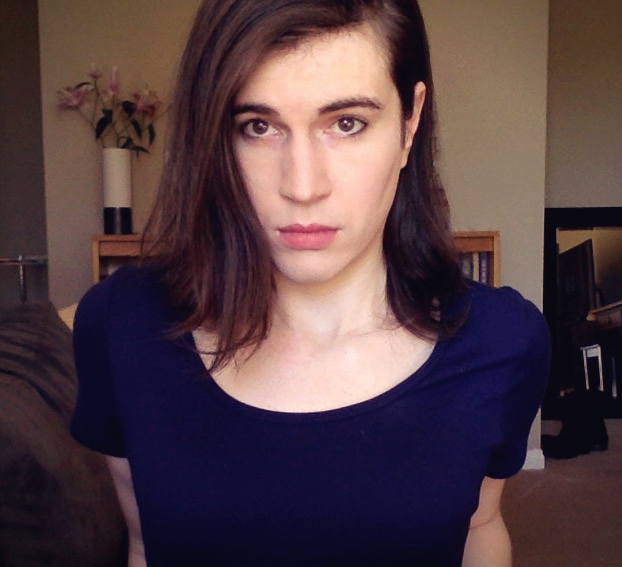Mourning Those Lost, Fighting for Our Lives: 2013 Transgender Day of Remembrance
By Princess Harmony
Imagine this: you’re born to the outside world being as healthy as you could possibly be. Imagine that while the world is telling you that you’re healthy, you know you’re not. You know that your body doesn’t feel correct, that you have extra pieces and there are missing pieces, as though you were a puzzle that someone tried to force together. Lastly, imagine that you were born into a world that is hostile to the mere utterance of such discomfort.
Are you finished imagining? Good. This is the reality of transgender (trans, from here on) people, I can’t say this is the sole reality or that everyone fits this idea, but some of us do. I know that I did. Some don’t experience the dysphoria that I, and others, have felt. Some have the racial, financial, or political power to resist the world’s hostility and hatred for trans people; but many don’t. I was born into a lower middle-class Puerto Rican family. I did not have the backing to deal with my initial pangs of dysphoria or the initiation of my transition. I had many strokes of luck during my transition. I could easily have ended up on any of the Transgender Day of Remembrance lists, but that’s getting ahead of this series of stories.
I, like most unrepresented or underrepresented minorities, searched for images that were like my own. Even as a child, I craved these images. I wanted to meet girls who felt like me, who looked like me, with bodies like my own. I had no knowledge of the word “transgender,” but having been a precocious child who read all of the “adult” books that my mother brought home from her medical assistant classes, I knew that those assigned male had penises and that those assigned female had vaginas. Despite that, I knew otherwise about myself. I knew that I was a girl. It was only a mission to find these people who were like me. I could not do it living where I did, a suburban Central Pennsylvanian town. I was born in New York, so I have family there. That is what enabled me to find girls like me.
I am about to embark on a story within a story within a story, the colorful story of trans sex workers. Since the dawn of time, there have been trans sex workers, even before the conception of the word “transgender.” They were given different names and held different places in society but they, like all sex workers, were always there. In modern times, being a trans sex worker is like playing Russian roulette by yourself; each time you meet a client and live, you survive the game for another round. Every time you play that game, the chances of you losing it increase. There are many reasons why trans women, particularly and especially ones of color, become sex workers. Survival, transition, and addiction only cover a portion of the reasons.
A majority of the transgender people who die are trans women of color who were forced, either by societal or direct means, into working the streets or working Backpage. This is the part of Transgender Day of Remembrance that is either not remembered or not written into the narrative at all. It’s an extremely important part of the narrative, because it makes the picture of trans oppression fully visible. Erasure takes many different forms, it’s not always outright deleting that a person lived and then was murdered. It’s more insidious than that. Sometimes it’s the deletion of the deeper and more nuanced reasons about why they were murdered. For example, if a trans girl is working the streets and she is murdered, what is the cause of her murder? Was it because she is transgender, because she is a sex worker, because she’s of color? The answer is that it’s all of those factors, the societal forces put her on that street where her killer was waiting.
Here I am, a young child with a somewhat strong idea of who I was and who I wanted to be. Where I had been, I could not find my own story. New York City was a different story. They had free newspapers and magazines that had colorful advertisements with pictures in them, advertisements for escorts and “massage therapists” (code word for prostitutes) who were women like me. It is where I learned the most disgusting word in the English language: shemale. Imagine that, a child who had yet to reach double-digits knowing not just what her future body might look like, but also knowing her destiny and the word she thought described her. That was my reality. I was fully aware of society’s expectations for trans women even before I was fully able to understand that I knew.
This patriarchal society fosters an environment where trans women die in the midst of attempting to survive. Simultaneously, there are also many instances when this society’s agents directly murder trans women. Let’s take the example of Nizah Morris, who was a woman who was beloved by her community, family, and friends. Ten years ago, she had too much to drink at a Philadelphia bar and the Philadelphia Police Department was called. The police say that she refused a trip to the hospital and gave her a courtesy ride to her home. In the end, she was found murdered with a wound to the head, which matched the butt of a gun. Officially, nobody knows what happened or who killed her. Unofficially, it’s easy to connect the dots and the unsaid belief is that the police killed her. Another example, which is also one of negligence and misconduct, is the case of Tyra Hunter. She was a trans woman who was in a car accident and required medical care. Normally, her injuries would have been treatable if she received equal access to care that anyone else would have been able to access. As she lay injured, EMTs at the scene mocked and degraded her, and the ER doctors refused to treat her. As a result of this misconduct, she died from injuries that are typically survivable.
Having the idea in my head that a trans woman of color could not be more than an escort, I worked. I was an escort and a cam girl, using the money I raised to pay for whatever I needed at the time. I worked my way through my second college year, until I no longer needed to do it. Had it not been for my parents’ acceptance, I would still be working. I’ve always done some kind of hustling for money, I am the type of person who doesn’t seem to have a job but always has money. Before I did sex work, I earned money to do academic work, which consisted of doing other peoples’ work for them. This was something that I was much better at than sex work. During my relatively short period of time in sex work, I experienced life-threatening violence, including a rape. It is a line of work that requires resilience and the ability to survive under impossible conditions, just like living as a trans woman of color is a “lifestyle” (for lack of a better word) that requires resilience.
On November 20, 2013, Transgender Day of Remembrance, take a moment to remember the extraordinary lives that trans women of color live in order to survive in this hostile society. Remember that while we might not live the way you live, or share in all of your struggles, we too suffer under a patriarchy that wants to control all of us and destroy those of us who resist its’ control. If trans women aren’t killed by lovers or by clients, we are killed by the police that are supposed to protect all citizens, or we are killed by prejudiced doctors and emergency personnel that refuse to do their jobs. When a sister dies, does she get justice? Most of the time, the answer is no. If the defendants don’t give the “trans panic” defense, then some other failure of the justice system will take place. That is, if the murderers are even arrested or if the death is investigated.
The entire time I was writing this piece, I was thinking about someone I knew. Lorena Escalera Xtravaganza, a beloved transgender woman who was known for her spectacular performances. Lorena died under mysterious circumstances in her Bushwick apartment. Officially, her death was ruled a homicide, a result of suffocation in the fire that struck her apartment. However, any actions to get the NYPD to investigate further were met with stonewalling and ignored messages. Any messages to Brooklyn Borough President, Marty Markowitz, were ignored despite hundreds of Facebook wall messages and calls to his office. The New York Times became infamous for its insensitive, sexualizing, and insulting story about her death, making references to her birth sex assignment and to her body. After responses from various LGBT organizations, transgender activists and advocates, and victim’s rights activists, the cries to the NYPD and the New York Times fell on deaf ears. Her death was not investigated and a killer has not been found. Her “family,” the House of Xtravaganza, was home to yet another unsolved and uninvestigated anti-trans murder. Just 23 years earlier, Venus Xtravaganza had been found murdered underneath a bed in a New York City hotel, one of many other deaths in the 1980s that have gone unsolved. Venus, unlike the other victims in that time period, is still remembered, in part as a result of having her House family and as a result of having been in the documentary Paris is Burning, immortalized and loved by many – including me.
If what I have written has not delivered the message, then I will say it as clearly as I can: the lives of trans women of color are often impossibly difficult, and yet, many of us are able to survive. We live on as daughters, friends, lovers, coworkers, and as humans. Remember that we are human beings just like you. We struggle with life’s challenges and we survive in spite of a patriarchy that tries to destroy us, similar to many of you. Our deaths may go unheeded by the majority, but know that trans women hurt every time each one of us dies unjustly. Transgender Day of Remembrance (TDOR) is a sacred day. It is a day to mourn those we have lost, whether we knew them or not. It should be a day for mourning and nothing else. It is a day that we mourn our dead, many of whom do not get mourned on any day other than TDOR. It is also the day that our anger boils down to us seeking justice for those who have not received it. Keep that in mind when anyone uses the day as a political or fundraising moment. For that matter, we should all keep this in mind.
My story has not come to an end. I no longer have to live that life. Presently, I am a college student who is living my life as a woman in recovery from trauma, addiction, and mental illness. Writing this piece was my catharsis. Although I might never know every trans woman who is murdered, when I hear about the murders, it breaks my heart and makes me angry, as if they were my sisters. I know that many other trans women feel this way. I’ve witnessed it in the faces of so many others. I’ve also heard it in their voices. Many do not get to complete their stories because their lives are murdered by cruel-hearted and bigoted people. Keep this in mind on November 20th.
This piece is dedicated to Diamond, Islan, Domonique, Kelly, Lorena, Venus, Gwen, Angie, Nizah, Tyra, and all the many other known and unknown trans women whose lives were viciously sacrificed because of anti-trans violence.
_______________________________________________
 Princess Harmony is a highly opinionated Afrolatin trans woman who is a survivor of sexual violence, drug addiction, and mental illness. She holds an Associates Degree in the Social Sciences and is currently pursuing Bachelors Degrees in History and Social Work at Temple University. Her writings include several published articles on HIV awareness, issues facing trans women, video games, and music. Follow her on twitter at @harmonybabydoll.
Princess Harmony is a highly opinionated Afrolatin trans woman who is a survivor of sexual violence, drug addiction, and mental illness. She holds an Associates Degree in the Social Sciences and is currently pursuing Bachelors Degrees in History and Social Work at Temple University. Her writings include several published articles on HIV awareness, issues facing trans women, video games, and music. Follow her on twitter at @harmonybabydoll.




0 comments